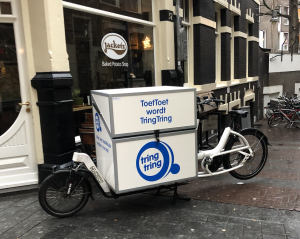In major cities, almost one in four retail spaces is HoReCa and his number is increasing. Thousands of HoReCa entrepreneurs receive their products from many small distributors every day. As a result, the HoReCa distribution of food services is growing fast. Researchers from the Amsterdam University of Applied Sciences did research into HoReCa distribution in Amsterdam and offer the municipality and business three directions for solutions.
HoReCa distribution
Of all freight transports (movements) in Amsterdam, 30% is intended for HoReCa. Every day, 3,000 delivery light commercial vans and 2,000 trucks drive to the nearly 5,000 HoReCa entrepreneurs in the city, with on average only two shipments. Three-quarters of this take place in the morning. The result is traffic congestion, unsafe roads, and air pollution.
Looking for solutions
The researchers propose three solutions to relieve the pressure on the city:
- Cooperation between the hotel and catering suppliers so that more goods go into the city with fewer vehicles, using (light) electric vehicles.
- An integrated policy vision on HoReCa distribution in which local regulations, the use of new technologies (such as electric vehicles and smart traffic information systems), unloading zones and partnerships between distributors and entrepreneurs are combined. Current projects in smart and clean HoReCa distribution can be combined with long-term solutions such as zero-emission regulations and smart unloading zones.
- Relevant data about the different flows of HoReCa distribution in the city, to support taking the right solutions. Fresh products, frozen products, and beverages have their own logistical characteristics and challenges. In addition, the challenges of distribution in each borough are different and therefore the use of measures such as vehicle restrictions and window times should also be different. Having the right data is indispensable.
The solutions are further elaborated in a Dutch report. Supported by knowledge institutions such as the Amsterdam University of Applied Sciences, policymakers, food service distributors and HoReCa entrepreneurs can jointly develop and implement solutions for smart and clean hospitality distribution.
Source: AUAS Urban Technology

